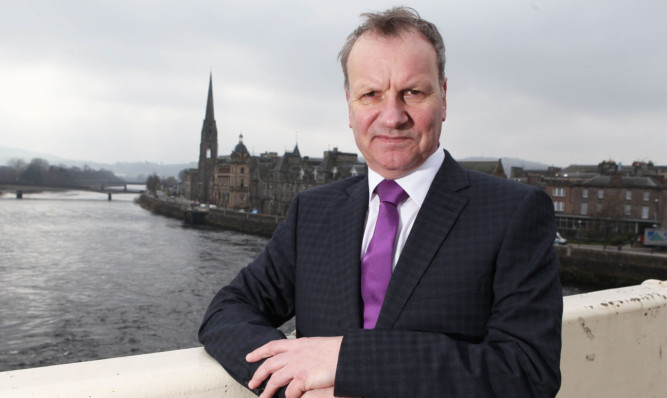Politicians have clashed over plans to give English MPs a veto over legislation which affects only England.
Scottish Secretary David Mundell claimed the move could make the Union stronger, but First Minister Nicola Sturgeon branded the measure a “constitutional shambles” which is “staggering in the extent of its hypocrisy and incoherence”.
Perth and North Perthshire MP Pete Wishart said it will make “independence more likely”.
The Electoral Reform Society accused the Tory government of trying to “railroad this complex change through with just one day’s worth of debate”, accusing ministers of “playing fast and loose with Britain’s constitution”.
The row erupted after Commons leader Chris Grayling announced a new stage is to be introduced for laws passing through Parliament, allowing English MPs to either accept or veto the legislation before it has its final reading in the House of Commons.
Mr Grayling said the changes outlined “give English MPs and in some cases English and Welsh MPs a power of veto to prevent any measure being imposed on their constituents against their wishes”.
He added: “No law affecting England alone will be able to be passed without the consent of English MPs.”
Mr Mundell, the sole Tory MP in Scotland, said: “This is an approach to bring some balance and equilibrium and fairness to the devolution settlement across the whole of the United Kingdom.
“English MPs can have a specific say in England-only matters and that’s all that it is.
“It is the opportunity for English members, with a new stage to be inserted in the Commons process, effectively to be able to veto measures they don’t agree with that apply solely in England.”
He insisted: “It doesn’t diminish the rights of Scottish MPs, it doesn’t create two classes of MPs.
“There’s no impact on financial decisions because Scottish MPs will still have a vote on the budgets of all UK Government departments.
“I think people will see through the bluff and bluster and forced anger at these proposals, and see that actually it’s about fairness, and it is perfectly fair that MPs in England should be able to have a say and veto measures they don’t agree with if these only apply to England.
“It will make the Union stronger because I think people in England will feel that their voice is heard on measures that affect only England and if a majority of English MPs don’t like something that is being proposed for England, they will be able to do something about it.”
The changes, which the UK Government is seeking to bring in using parliamentary standing orders, have to be approved in a Commons vote on July 15 – when the opposition will look to test the Tories’ slender majority.
But Mr Mundell said: “We’ve set out a very coherent and sensible set of plans, and I would hope it would command support.”
Ms Sturgeon argued, however, that the changes “are all about cutting Scottish MPs out of votes which impact on Scotland and our budget”.
She said amendments to the Scotland Bill had not been passed despite having the support of almost all the members north of the border, with the Conservatives using English MPs to ensure these were voted down.
The SNP leader said: “They are imposing a totally inadequate Scotland Bill – which fails even to live up to the recommendations of the Smith Commission, never mind responding to the election result in Scotland – on the basis of the vote of a single Tory MP in Scotland, in defiance of the views of the 56 SNP MPs and frequently the 58 non-Tory MPs.
“The Westminster system wants an English veto – but rides roughshod over the democratic rights of the people of Scotland.”
Ms Sturgeon added: “I have been very clear that, at least in part, the level of support for independence will be determined by what the Tory government at Westminster does, as well as what the SNP government does.
“There is no question that the great disrespect shown to Scotland in these proposals is likely to have more people asking whether Westminster is capable of representing Scotland’s interests at all.”
But Mr Mundell responded: “It’s very silly politics to constantly threaten to have a referendum every time you don’t get what you want.”
He stated: “Obviously Nicola hasn’t examined the detail of the proposals.
“When she examines the detail she will see there is no detriment to Scotland at all from these proposals, but they are bringing fairness and balance to England.
“During the general election campaign, as I remember it, Nicola set out on many occasions that she had the interests of people in England at heart.”
Pete Wishart MP said: “This is the most profound constitutional announcement since Gladstone. It is an assault on the rights of Members of this House which will create second-class MPs.”
He questioned why the government could not apply the same principle to the Scotland Bill because this week “English MPs vetoed the will of Scottish voters”.
Amendments to the bill backed by 58 of the 59 Scottish MPs were defeated.
Mr Wishart added: “I almost want to congratulate the Leader of the House for making independence more likely.”
